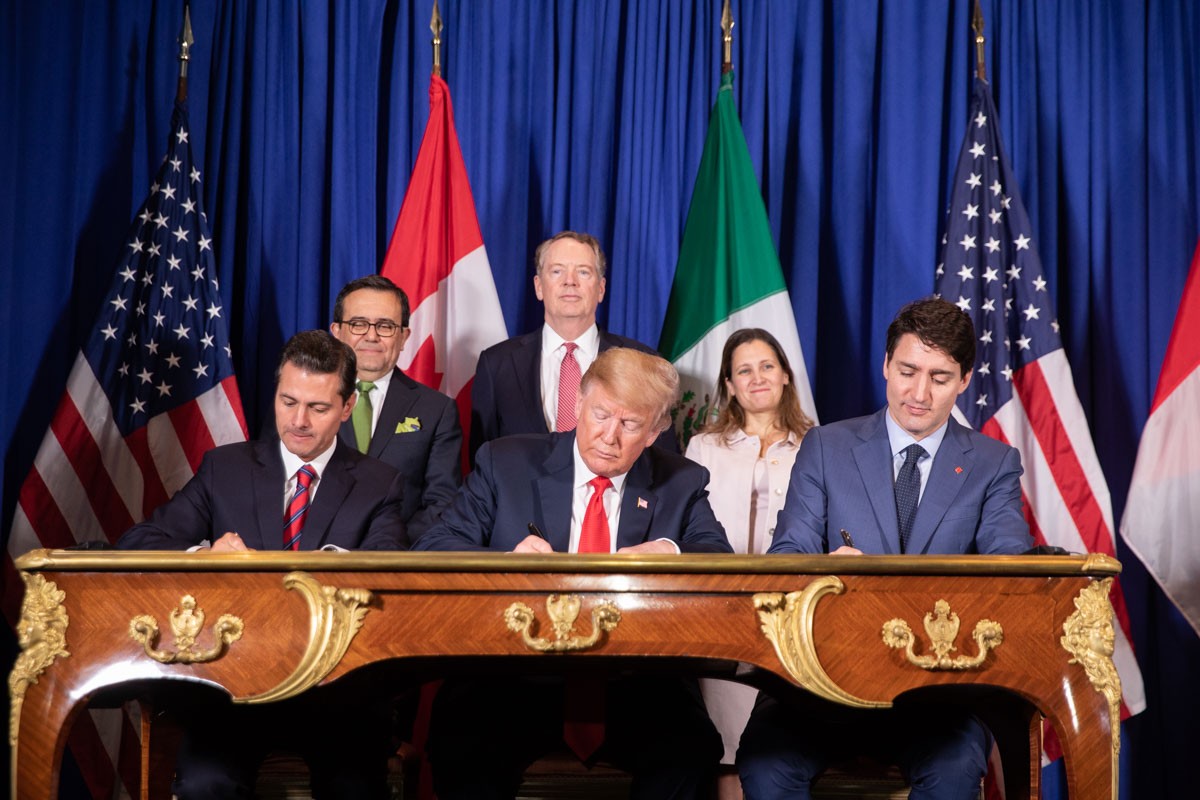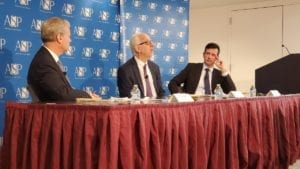
Event Recap: The Future of USMCA
Podcast: Play in new window | Download
Subscribe: Apple Podcasts | RSS
[embedyt] https://www.youtube.com/watch?v=PnIlaJds3OM[/embedyt]
The American Security Project hosted a public event on the future of the United States-Mexico-Canada Agreement. Distinguished guests Eric Farnsworth and Ed Gerwin joined us for a panel discussion of the USMCA and the implications of free trade on national security. Congressman Henry Cuellar (D-TX), provided introductory remarks before the panel. ASP COO Andrew Holland moderated the discussion.

In his introductory remarks, Congressman Cuellar first spoke broadly about the importance of trade and commerce, which he noted are an instrumental part of great civilizations. He emphasized how trade policy should focus on the interests of the country, and how it shouldn’t be subject to the partisan interests of Democrats or Republicans. Echoing Holland’s introduction, he stated trade’s importance isn’t only economic. It strengthens relationships between countries by facilitating conversations. He also highlighted the way trade facilitates the interests of the United States. Trade serves the United States’ best interests by helping create strong, prosperous, and stable neighbors. While he acknowledged some people forget the merits of trade, he stated the environment seems to be changing. Labor groups don’t seem as opposed to concluding a trade deal, and he is optimistic USMCA could pass in November or December.
Congressman Cuellar then addressed the topic of the USMCA in greater depth. Out of the options available to the United States, he talked about the agreement is the best path forward. While the repeal of the North American Free Trade Agreement would damage relations with Mexico and disrupt the important trade between the two countries, the existing NAFTA agreement is becoming dated. The USMCA provides an opportunity to maintain and modernize the United States’ relationship with its neighbors. He identified how a new agreement would allow issues like labor reform, enforcement, the environment, and pharmaceutical matters to be better addressed. He pointed to Nancy Pelosi’s decision to set up a task force as a sign things are moving in the right direction.

Eric Farnsworth took the opportunity to highlight how much the world has changed since NAFTA was first negotiated. Today email is ubiquitous, but he recounted how it was relatively novel in the early 1990s. In addition to the dramatic changes in technology, he mentioned how much things have changed between the United States and Mexico. Before NAFTA, the level of trust between the countries was low and the security situation was borderline hostile. Following NAFTA, the relationship matured. High-level intelligence is being shared, and now the countries can work jointly to secure the border. Although these changes can not be solely attributed to NAFTA, he used them to point out the significant change that can be wrought by trade.
Ed Gerwin identified two of the key benefits of the USMCA. Firstly, the agreement retains the central core of NAFTA. Like Eric Farnsworth, he noted how NAFTA had served as an important vehicle driving real change. The agreement has allowed the United States, Canada, and Mexico to build things together, with the creation of automotive and medical goods facilitated by the ability to move components freely between borders. 33 states hold Canada as their top trading partner, while 7 states hold Mexico in the same position. The second benefit is the USMCA allows for us to modernize NAFTA. It presents the opportunity to make labor and environment provisions part of the core agreement. Some of the most important changes relate to the digital world. The agreement would enable digital trade to be treated like physical trade. Cooperation would also lead to advancements in cyber security and privacy.
Turning to the future, the panel considered the United States’ next steps. Adopting the USMCA would allow the United States to “clear the deck,” and work on future trade policy. The panel agreed that it was important for the United States to work on the WTO. Eric Farnsworth identified Brazil and the United Kingdom as countries where important trade agreements could be made, but stressed it was better to conduct multilateral trade negotiations than bilateral ones. Ed Gerwin stressed importance of the domestic implications of trade. He discussed the need for greater education about the impacts of trade, programs to insulate the workforce from harm, and working to diminish negative perceptions about trade.
Related News:
Cuellar: USMCA vote depends on Mexico budget for labor enforcement
What to Know in Washington: Ukraine Scandal Grows Into Threat.





